MSN Lifetime Awards
1. Background
Malaysian Society of Neurosciences (MSN) was registered on 3rd March 1989 and since then has been led by many senior clinicians who have contributed significantly in the development of the neurology services as well as research in Malaysia. The MSN lifetime achievement award, beginning 2015, is proposed as a way of recognizing the numerous & valuable contributions made by outstanding members.
2. Selection Committee
A selection committee will be appointed by the MSN Executive Committee each year, to shortlist and decide on a candidate. Three senior members (clinicians or scientists) will be appointed to form the committee.
3. Selection Process
The selection committee will select ONE awardee annually, based on the selection criteria set below.
4. Selection Criteria
The criteria are set into 4 broad categories, and each is given a score of 1 – 5 (i.e. 1 for minimal contribution and 5 for significant contribution). The total score will be the sum from all 4 categories.
- Contribution to the MSN
- Contribution to the neurology services in Malaysia
- Contribution to the neurology-related community services in Malaysia
- Contribution as a clinical investigator or advocate for the principles of the Neurology
5. Proposal of nomination submission
Any active MSN Life member can submit one proposal each. The proposer needs to write a proposal listing out the contributions of the nominee in all the four categories as stated above. A successful awardee may not be proposed again in the future.
- Schedule
- 31 January 2015 – Submission of name (letter of intent)
- 31 January 2015- Appointment of selection committee members
- 31 March 2015- Submission of proposal
- 31 May 2015- Selection of award winner
- 7 June 2015- Award ceremony @ MSN Annual Scientific Meeting (ASM)
7. Award
The award includes free ASM registration for the rest of their lives, if attending and for that year’s ASM, hotel accommodation, MSN Lifetime Achievement Medal and certificate.
8. Past MSN Lifetime Awardee(s):
(a) Dato' Loh Thiam Ghee (2015)
(b) Prof Dato' Dr Tan Chong Tin (2017)
MSN Lifetime Achievement Award 2015
Dato Dr. Loh Thiam Ghee was granted the first MSN Lifetime Achievement Award 2015
 Dato Dr. Loh Thiam Ghee (6th from the right) with his family and the current and ex-executive committee members of MSN, taken on 7 June 2015 at Weil Hotel, Ipoh
Dato Dr. Loh Thiam Ghee (6th from the right) with his family and the current and ex-executive committee members of MSN, taken on 7 June 2015 at Weil Hotel, Ipoh
The MSN Lifetime Achievement Award is the most honor award of the Malaysian Society of Neurosciences (MSN), a society formed by professionals and allied health professionals in the field of neurology. This is the first time the award is given based on the contributions of a member to the neurology services in Malaysia, as well as to the society. Dato Dr. Loh Thiam Ghee was granted the first MSN Lifetime Achievement Award in Weil Hotel, Ipoh on the 7th June 2015.
Contributions of Dr. Loh Thiam Ghee
Dr. Loh Thiam Ghee, MBBS (Mal), FRCP (Glasgow), FRCP (Edinburg), FRCP (London), was born and had his early education in Taiping, Perak. He did his medical training in University of Malaya, Singapore. After completing the MRCP in internal medicine in UK, he underwent further training in Neurology and Neurophysiology in Oslo, Norway.
Contribution to the neurology services in Malaysia
Dr. Loh was one of the first few foundation lecturers in the Medicine Department, University of Malaya. Together with Assoc. Professor K Somasundrum, Dr. Vignandra, and later Dr. Yee Woon Chee, he also helped to lay the foundation of the Neurology Laboratory and Neurology services in University Hospital, now known as University Malaya Medical Centre. Other than as Professor of Medicine, he also served in various capacities as Deputy Dean, Faculty of Medicine and Head of Department of Medicine. For his contributions to the University, he was honored with Datukship by the Sultan of Perak. With his supervision, he has also trained a few neurologists, including Prof. Datuk Dr. Tan Chong Tin, Dr. Lee Moon Keen and the late Dr. Ho Chin Ching, who became the few leading neurologists serving the country subsequently. After leaving the service in UMMC in the early nineties, he continued to serve the community by practicing as Consultant Neurologist first in the Tung Shin Hospital, then in Sime Darby Medical Centre.
Dr. Loh is an excellent clinician and teacher. His model as dedicated clinician and teacher has helped to mold the professional culture of Neurology practice in this country.
Contribution to the MSN
Dr. Loh Thiam Ghee was the early leaders of MSN. The idea to form a Malaysian Society of Neurosciences came about during the 2nd ASEAN Neurosurgical Meeting held at the Hilton Hotel, Kuala Lumpur from 29th June to 2nd July 1986. A meeting was called to discuss the constitution on 25th October 1986 at the University Hospital. A Protem Council was formed and Dr. Loh Thiam Ghee was elected as the President, with Dr A Mohandas as Vice-President, Dr. Fadzli Cheah as Secretary and Dr Nik Aziz as Treasurer. Assoc. Professor CT Tan, Dr. T Selvapragasam and Dr. Mohd Rani Jusoh were the members of the Council. The Malaysian Society of Neurosciences was fully registered with the Registrar of Society on 3rd March 1989. Dr. Loh held the position of President till 1993 before passing the baton to Dr. Richard Veerapen. Dr. Loh has thus helped to lay the foundation of the MSN, which has become the main body to network and represent the Neuroscience fraternity in this country.
Speech by Dr. Loh in receiving the award
I thank the Malaysian Society of Neurosciences (MSN) for offering me this award. When I was first informed about it in April I was surprised and asked myself ‘Why Me’? Such an offer should have a good reason. Later when I met Prof KS Lim, I suggested could it be because I am one of the oldest practising neurologists in the country! A neurologist is like a soldier fighting against the enemy. It has been said old soldiers never die but only fade away to fight again. Neurology is mind challenging and it is an addiction too. I am like the old soldier who continually wishes to fight another day.
I thought of the older general clinicians who practised Neurology in the crowded wards of public hospitals without modern ubiquitous laboratory investigations and high powered imaging techniques. They relied on clinical skills and honoured their acumen by their long and frequent follow-ups and dedication to patients. They practiced in a spectrum of neurodiseases mainly of infections from bacteria like TB and syphilis, strokes and nutritional deficiency. A constant reminder in those days is syphilis, the great imitator.
Some doctors like Prof. Dr. TJ Danaraj, Prof ES Monteiro, Prof Gordon Ransome and Dr. Gwee Ah Leng were well known practitioners and teachers of Neurology to name a few. Their clinical skills and dedication to Neurology were handed down to their pupils. They in turn, with their more advanced training and better exposure to more cutting edge medical investigatory laboratory and imaging techniques, enabled some of the conditions like multiple sclerosis and myasthenia autoimmune disorders affecting the nervous system to be diagnosed. These were believed not to be seen or uncommon in the country but are now firmly confirmed to occur locally. Correct diagnosis improved their management. It resulted in more research and publications. More neurologists were trained, leading to subspecialization. The need for other related neurological disciplines and personnel also expanded to fulfill the needs of an expanding specialty. We need to recognise the contribution of these old clinicians to the start of Neurology. I consider myself as a bridge to the past and the present.
As for the future, I foresee MSN having an important role in highlighting the looming problem of an ageing population in the country – from an increase in dementia disorders to the financial costs of their health and social care. Neurologists must place greater emphasis on prevention, such as lifestyle changes e.g. diet, exercise, weight loss, and to stop smoking and reduce alcohol intake. Better detection of hypertension, diabetes, heart disease and their control will help to reduce the complications of strokes.
Once again, thank you very much to the MSN, its president and members of the awarding committee for this award. I also accept it on behalf of those who have gone before us. They contributed enormously to the start of Neurology in this country.
MSN Lifetime Achievement Award 2017
Professor Dato' Dr Tan Chong Tin
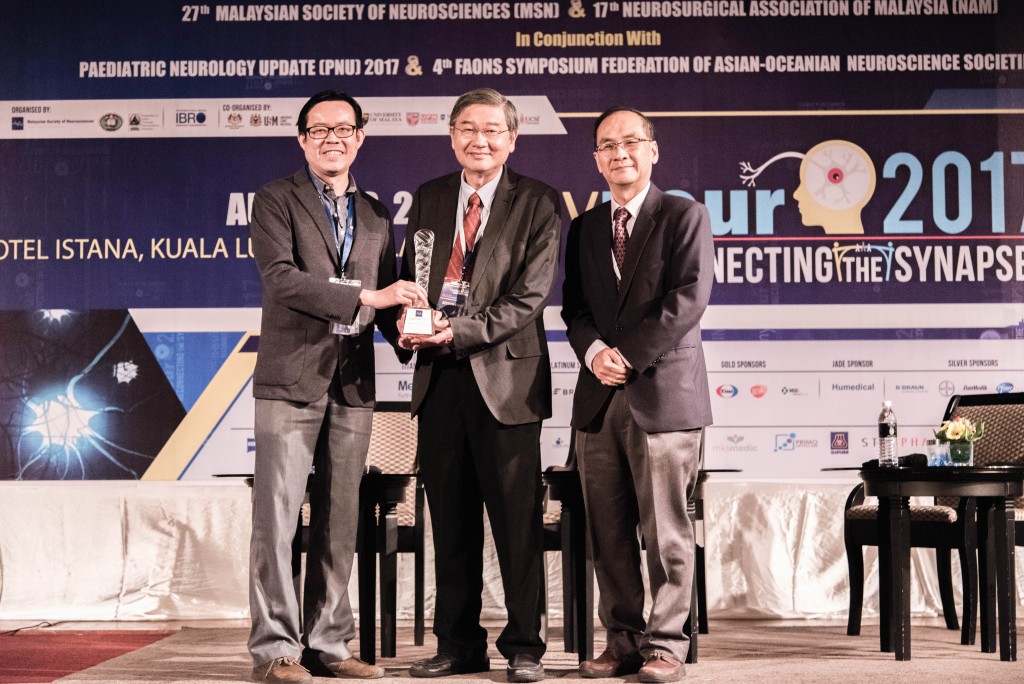
BRIEF BIOGRAPHY
Professor Dato' Dr. Tan Chong Tin was born in Penang on October 27th, 1948. He received his early education at Chung Ling High School and obtained his medical degree from the University of Melbourne in 1972.
He joined University of Malaya as a Lecturer in 1977 and was awarded a Commonwealth Medical Fellowship to the Institute of Neurology, Queen Square, London, in 1982. In 1990, he was awarded MD by the University of Malaya and was appointed Full Professor in 1992.
He is married to Mdm Irene Yek Siew Hong and they have two sons, Dr. Tan Li Ping and Mr. Tan Li Kuo.
CONTRIBUTIONS TO RESEARCH IN CLINICAL NEUROLOGY AND NEUROSCIENCES
Through his dedication, clarity of vision, originality, and ability to combine clinical and scientific skills, Professor Tan Chong Tin has made numerous important discoveries in clinical neurology. His earliest work was in establishing the prevalence of multiple sclerosis in Malaysia.
In 1998, a mysterious and rapidly fatal encephalitis affected more than 200 individuals in pig-farming communities in the state of Negri Sembilan in Malaysia. Professor Tan led a team of clinicians and scientists across different specialties in the University of Malaya, to study and combat the disease, which was threatening to become a pandemic.
Their ground-breaking work led to the landmark discovery of Nipah virus encephalitis in 1999. The meticulous work of the team gave rise to many publications in top medical and scientific journals, including the Lancet and the New England Journal of Medicine. For their outstanding contribution, the Nipah Virus Encephalitis Investigation Team was conferred the prestigious Mahathir Science Award in 2006 and the Merdeka Award in 2008.
Professor Tan, together with younger specialists he has nurtured and trained, has continued to make significant contributions in neurology including, most recently, identification of Sarcocystis nesbitti as a cause of febrile myositis in humans, characterization of tuberculous meningitis, and improved understanding of the psychological aspects of epilepsy.
Professor Tan has been a strong advocate for research in clinical neurology and the neurosciences in Asia. He has been the Editor-in Chief of Neurology Asia for over two decades and is an Editorial Board member of several important medical journals. In recognition of his scientific excellence, Professor Tan was a recipient of the James H Nakano Citation Award from the United States Centres for Disease Control and Prevention in 2003 and the University of Malaya Vice Chancellor's Award for Highest Impact Factor and the Most Highly Cited Paper in 2007.
CONTRIBUTIONS TO CLINICAL NEUROLOGY SERVICES
Professor Tan was one of the pioneers in developing clinical neurology and neurophysiology services in Malaysia. As the Division Head of Neurology at the University of Malaya Medical Centre (UMMC) for over two decades, he was involved in the training of more than 50 Malaysian neurologists and was instrumental in formalizing the neurology subspecialty training program in the country.
He was Chair of the National Specialist Register for Neurology from 2005 to 2013. His dedication to neurology training in under-served regions of the world has also seen more than 50 neurology Fellows come through the Unit, from countries such as Myanmar, Indonesia, Laos, Vietnam, Bangladesh, Mongolia, Nigeria, Sudan, and Mozambique.
Prof Tan was a great mentor not only to many neurologists, but has personally fostered a group of keen neuroradiologists, paediatric neurologists, neurosurgeons and allied health professionals as well.
CONTRIBUTIONS TO NEUROLOGY EDUCATION
Over the years and in many ways, Professor Tan has helped to bridge the gaps in neurology education in the region. Besides chairing and speaking in various international conferences, Professor Tan was the founding member of several important neurology societies; namely the Malaysian Society of Neurosciences, ASEAN Neurological Association (ASNA) and the Pan-Asian Committee for Treatment and Research in Multiple Sclerosis (PACTRIM); which aimed to promote neurology education, research and networking in the region. Professor Tan also served as the Vice President of International League Against Epilepsy (ILAE) from 2005 to 2009 and has helped formed the Commission of Asian & Oceanian Affairs and Asian Epilepsy Academy (ASEPA) within the ILAE. He was awarded the Ambassador for Epilepsy by the ILAE in 2005 for his remarkable contribution in advancing the cause of epilepsy.
MSN Lifetime Achievement Award 2019
Prof. Dato' Dr. Raymond Azman Ali
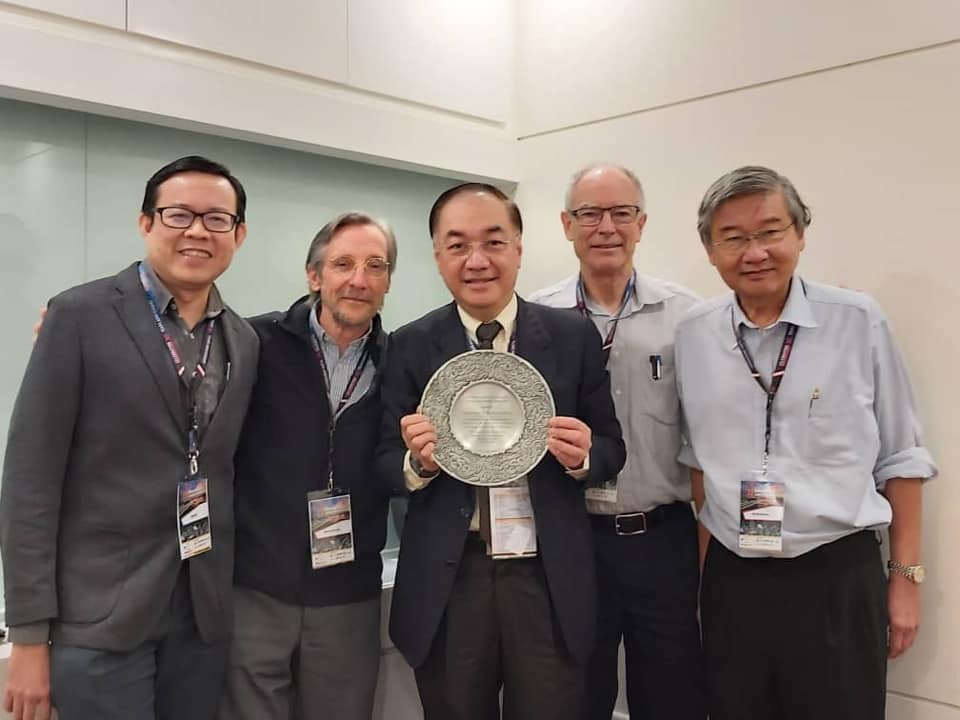
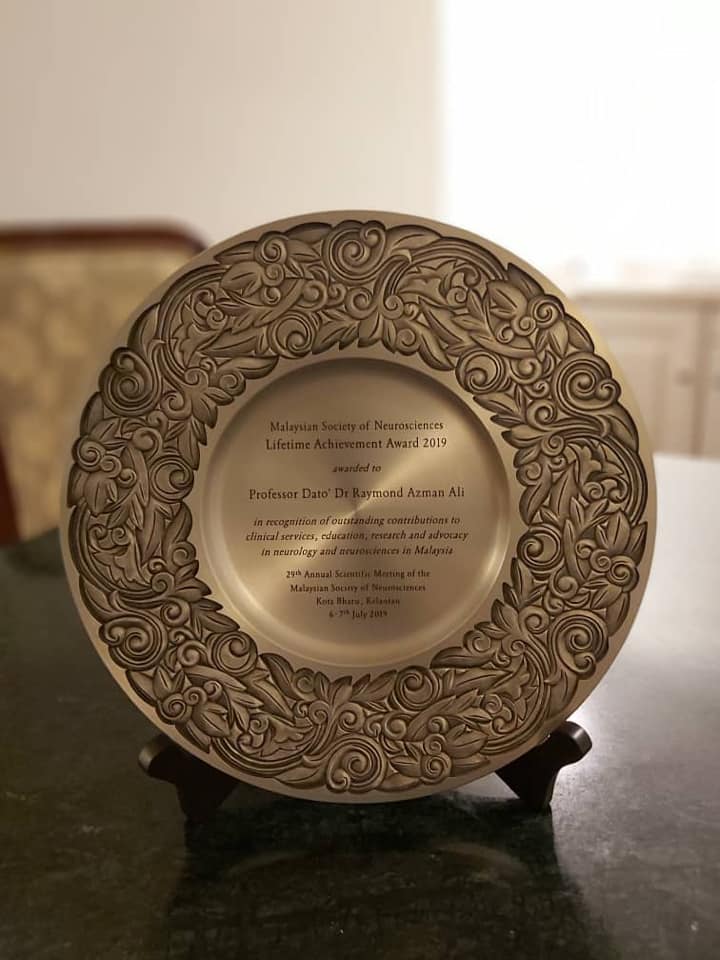
It gives me great honour and pleasure to be here to share with everyone the lifetime achievement of Prof Dato Raymond Azman Ali. Prof Raymond was born in the Pearl of the Orient, Penang. Little did everyone know; little Raymond was destined to be the Pearl of his family. He did tremendously well in school, and he pursued his medical degree in Monash, graduating with Honours. Having return to Malaysia, he worked in the old Hospital Kuala Lumpur, toiling the nights amongst hordes of patients on creaky iron and canvas beds. It was quite a feat seeing Dr Raymond clerking his patients surpassing the midnight oil. He was always a bright scholar and obtained both the Masters of Internal Medicine from UKM and Singapore. He was the first neurologist to obtain his doctorate in epilepsy research (MD) at the Institute of Neurology, Queen Square in 1996. He was awarded the FRCP (Glasgow) and FAMM.
He was instrumental in setting up the neurology unit in UKM as he single handedly trained most of us. Those of us who were privileged to be under his tutelage will always cherish the fun during his classes. His favourite topic was on fits and funny turns; elaborating the quirks of neurological diagnoses. Neurology was one of the most feared subjects for many of us but Prof Raymond always made Neurology interesting and Easy to understand. Being the eminent Chairman of the Epilepsy Council of Malaysia, he has promoted epilepsy throughout Malaysia. He goes on his tireless roadshows, educating the doctors on the management of epilepsy. On our wapp group, we will be greeted by his friendly selfies and 'wefies' of him with his eager audience in different hospitals in each time. One ever wonder what is his secret to his boundless zest of energy, often putting the junior ones like us to shame.
As a dedicated teacher, his teachings are so valuable that he was awarded the Tokoh Pengajar Award. On the national level, he won the Anugerah Akademik Negara from the Ministry of Higher Education and he was the 1st medical doctor to win the award. Of course, his list publications are endless with his original articles in BRAIN being cited >500 x. His impressive researches have also earned him the Top Researcher of UKMMC.
As the Medical Dean and Director of UKMMC, he had a strong sense of reliability and responsibility that contributed in the management of the hospital.
He starts of the day before the crack of dawn, going through his schedules before heading down to the clinic. Despite his hectic schedule, he manages to teach the undergraduates, postgraduates and trainees. Pouring through epochs and epochs of EEG and guiding us through all the patterns and abnormalities, he will always remind us on the spikes and sharps. "If it doesn't draw blood, then it's not sharp enough to be a spike or sharp wave."
With such outstanding expertise and record, it's no wonder that many patients come from local and abroad to seek for his consults. Prof Raymond's patient was the first who underwent epilepsy surgery in Malaysia and was completely cured.
He has such a bubbly personality, meticulous, always gracious and accommodating. He has been an avid facebooker and wapp-per. Of course, he will always be the first person to wish us a happy birthday at 6 am, even though the birthday person is still fast asleep.
He has enriched most of our lives where he taught and mentored us diligently. He has motivated most of us in this hall to be a better doctor, physician, neurologist and nothing could match the tremendous efforts showered by him. He has contributed all his efforts, neurons and synapses 101% to the neurology fraternity. Finally, my short speech does not do justice to the extent of Prof Raymond's contribution to the medical and neurology field. As his student, mentee, and friend, I would like to summarise as the following:
- R - Rustling through the EEG records
- A - Amidst the spikes and waves
- Y - Years of excellent teaching and nurturing
- M - Meticulous mentor for many from near and afar
- O - Often seeking for his expertise and opinion
- N - Non epileptic or true epileptic?
- D - Dato Prof Raymond will determine the truth
- A - Astounding everyone with
- Z - Zillions of neurons and synapses
- M - Marvellous and magnificent
- A - Absolutely admirable
- N - Never will anyone be like you.
Before I end, izinkan saya mengakhiri ucapan saya dengan serangkap pantun:
Ke Kota Bahru kita semua,
Naik flight atau kereta sampai juga,
Prof Dato Raymond: Penghargaan MSN dari kita semua,
Ucapan terimakasih yang tidak terhingga.
From Dr Tan Hui Jan
MSN Lifetime Achievement Award 2022
Citation for Professor Ong Lai Choo, MSN Lifetime Achievement Award Recepient 2022
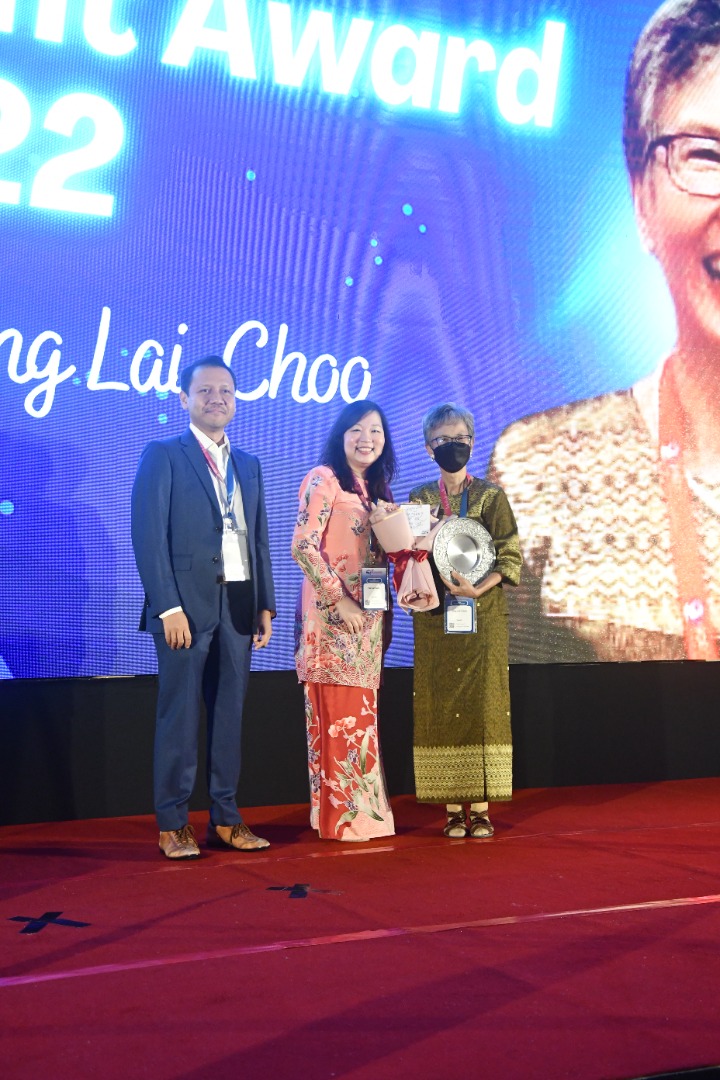
I like to firstly acknowledge the assistance of Prof Wong Sau Wei of UKM who can’t be here today in preparing this citation.
It is with great honour for me, as well as the CCNDP fraternity of MSN to introduce MSN Lifetime Achievement Award 2022 recipient, my teacher and former mentor, our very own, spirited Professor Dr Ong Lai Choo.
Thou, I may not be the best person to give this citation but as one of her neurology trainees in HUKM many years ago, followed by the four years in CCNDP, I will try my best to present a citation of Professor Ong Lai Choo but I must humbly admit it still won’t do justice to summarise her decades of achievements and professionalism as an astute clinical neurologist, academician and dedicated teacher.
Coincidentally she was born on this very day, 1st October in Melaka at the very dawn of Malaya’s nationhood. After completing her studies, she was selected to enroll in Faculty of Medicine, University Malaya. UM not only awarded her the MBBS scroll in 1981, she also scored her college sweetheart and lifetime partner, with whom she later raised 3 children.
Subsequently she attained her MRCP and Diploma in Child Health (London) in 1985 and soon thereafter embarked on her journey in academia as a lecturer in Department of Paediatrics, UKM from 1988 where she pursued her interest and training in child neurology until her official retirement as a Professor in 2011. She returned to work at her Alma Mater UM on a contractual basis due to her great passion in teaching and possibly as an excuse to take respite from her famously rowdy grandkids at home. She confided to us that she is here today – because her leave application has been approved by her grandkids.
Child Neurology services in Malaysia were undoubtedly pioneered by our pair of Yin and Yang in the persona of Prof Ong and Dato Dr Hussain Imam, both initially based in Hospital Kuala Lumpur.
She founded the first Spina Bifida clinic in the country at HKL with Paediatric Nephrologist Dr Lim Yam Ngo and Urologist Professor Clarence Lai in 1992.
Later in HUKM, she also established and expanded the child neurology services including the Malaysia’s first dedicated paediatric feeding disorder clinic , multidisciplinary clinics for Botulinum toxin , cerebral palsy and spina bifida , which are all still running until now.
AcademicsSupported by her colleagues in academia, she initiated studies in the various aspects of child neurology disorders among Malaysian cohort, particularly Epilepsy, Cerebral Palsy and Paediatric Rehabilitation, and subsequently has published more numerous papers in various Malaysian and International Journals, as well as reviewer for several neurology journals.
In recognition on her achievements, she was the first child neurologist of SEA to be the recipient of the Bernard D’Souza International Fellowship Award from the American Child Neurology Society in 1994.
Contribution to MSNShe is a life member of MSN since 1993 and had served as exco member for MSN and the Epilepsy Council. Together with a few others, she founded CCNDP, taking up the role as its first treasurer.
She was the scientific chair of 6th AOCCN 1997 in Penang, helped organized AOMC 2007 Penang, ASNA 2009 KL and played a keyrole in the chapter’s updates and teaching courses.
Under her guidance, the chapter has grown from strength to strength and is celebrating its 20th anniversary in 2022.
Neurology EducationShe has been directly responsible in training a number child neurologists, first being Prof Wong Sau Wei, myself and a few more budding neurologists in University Malaya.
Given her reputable standing in ASEAN region, several foreign child neurologists from Myanmar and Indonesia have also spent some time training with her.
PersonalityHer easy going, vibrant and animated personality is highly infectious, frequently revitalizing dreary meetings or long clinic days, lighting up group conversations, helped keeping us awake during our very late night AGMs and I believe was an essential part of her excellent working relationship in the various multidisciplinary clinics.
Though she is free spirited and lively, she also possess an envious level of wisdom that can critically assess problems (especially non-clinical ones), offering very insightful and balanced analysis, expressing them in a calm and persuasive manner.
Ladies and gentlemen, I am very proud to present to you the trailblazing Prof Dr. Ong Lai Choo, the first Child as well as first female neurologist to be bestowed with this Lifetime Achievement Award for 2022.
Prepared by
Dr Feizel Alsiddiq
Consultant Paediatric Neurologist Chair CCNDP
MSN Lifetime Achievement Award 2022
Citation for Allahyarham Dato Dr Mohd Rani bin Jusoh
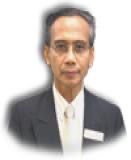
Dato' Dr. Mohd Rani Bin Jusoh was one of the most senior neurologists in Malaysia. He obtained his MBBS (Malaya) in 1975, MRCP (UK) in 1980, MRCP (Ireland) in 1980, FRCP (Ireland) in 1991 and FRCP (Edinburgh) in 1997. He worked as a lecturer in Neurology and Medicine at Universiti Kebangsaan Malaysia from September 1981 to December 1985. In 1985, he completed a Fellowship in Clinical Neurophysiology at the Newcastle General Hospital, England and Fellowship in Clinical Neurology and Neurophysiology at Toranomon Hospital, Tokyo Japan in 1991.
Dato' Dr. Mohd Rani was Head of the Neurology Department, General Hospital Kuala Lumpur from 1986 to 2001. He trained many neurologists including Dr. Abu Bakar Rahman, Dr. Rahimah S Shah, Dr. Sng Kim Hock, Dr. Yong Fee Mann, Dr. Julia Shahnaz Merican, Dato' Dr. Raihanah Abdul Khalid, Dato' Dr. Hj. Md. Hanip Rafia, Dr Santhi Datuk Puvanarajah and Emeritus Prof Dato Dr Raymond Azman Ali. During his term as Head of the Neurology Department, he helped set up electrophysiology units in many state hospitals. He also started the first botulinum toxin clinic in the government setting.
He was involved in a few important clinical practice guidelines (CPG) in the field of Neurology in Malaysia, including chairing the consensus statement of the management of ischaemic stroke expert panel in 2000 and being appointed as an expert reviewer for the 2nd edition of the CPG on management of ischaemic stroke, in 2012. He was also the Chairman for the 1st Consensus Guidelines on Brain Death in 1993, and Chairman for its 2nd review in 2003.
He formed the Malaysian Society of Epilepsy and was the first President of the society.
Dato' Dr. Mohd Rani commenced his practice at KPJ Ampang Puteri Specialist in August 2001 and was appointed Medical Director of the Ampang Puteri Specialist Hospital in 2004.
Dato' Dr. Mohd Rani was one of the founding committee members of the Malaysian Society of Neurosciences, which was formed on 3 March 1989. He was also one of the committee members from 2006-2008.
Dato' Dr Rani was also appointed as one of the members of the Board of Directors of The Neuroscience Foundation of Malaysia (NSFM), formerly known as The Neurosurgical Foundation of Malaysia, for two terms. His first tenure was from 23 November 1987 to 15 October 2001 in his capacity as Head of the Department of Neurology, HKL. His second appointment was from 21 January 2004 to 30 June 2012, during which, he served as the Honorary Secretary of the foundation.
Dato' Dr. Mohd Rani Bin Jusoh passed away on Thursday 2nd August 2012 / 13 Ramadan 1433 from advanced cancer. He is survived by his wife, 3 sons and 1 daughter. One of his sons is a well-known movement disorder neurologist at UKM with a PhD from Melbourne, Australia and another son is a stroke physician.
Today the Malaysian Society of Neurosciences is honoured to award Allahyarham Dato Dr Mohd Rani Jusoh with a posthumous Lifetime Achievement Award.
